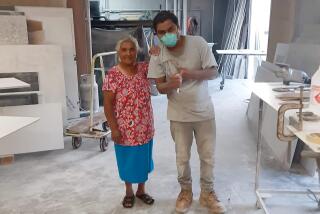Ex-Employee Crusades for Implant Safety : Health: Engineer says Dow Corning ignored his warnings on silicone gel breast implants. He serves as an expert witness in suits against company.
- Share via
LAGUNA NIGUEL — Tom Talcott is a portrait of indignation. In the cluttered office in his home here are sets of files subpoenaed from Dow Corning Corp., the silicone breast implant manufacturer where he began his career as a materials engineer.
The data is sealed under court order, but Talcott has had access to the information as an expert witness in trials involving women who contend that their autoimmune diseases were caused by silicone breast implants.
As Dow Corning, amid increasing concerns about the safety of its product, makes public hundreds of pages of documents on the development and testing of breast implants, Talcott is in a position to compare the two sets of information. What he sees does not make him happy.
“I’m spitting nails,” Talcott growled into his phone last week as he called the federal Food and Drug Administration to complain.
Thomas D. Talcott, 64, who spent 24 years at Dow Corning, had turned to a section containing the minutes of a task force he served on to expedite the development and marketing of a new variety of breast implant in 1975.
Back then, Talcott recalls, he repeatedly complained to Dow Corning management that the fluid gel planned for use in the implants to make them more lifelike would be dangerous because if the devices ruptured, the chemical fluid might spread through a woman’s body.
As a former employee turned whistle-blower in the battle over implants, Talcott fumed as he thumbed through the task force documents that were made public. The way he saw it, many Dow Corning documents were missing--and he suspected that many that the Michigan company is retaining may be incriminating. His skeptical attitude is characteristic of a man who has waged a 17-year campaign to alert the medical implant industry, plastic surgeons and government regulators that, over time, silicone gel implants could mushroom into a major public health problem.
Finally, federal and state authorities are listening. In January, the FDA placed a moratorium on the sale of silicone gel breast implants pending further study, in no small part because of the continuing pressure by Talcott and other critics.
Talcott, who now runs a optometric lens business, has been making the rounds of the major federal health advisory committees. This week, he will testify before a panel that will advise the FDA, based on new information, on whether silicone breast implants should be allowed to be marketed again.
Talcott said that when he appears before the panel Wednesday he will recommend that before they go back on the market, more animal studies should be done to obtain the kind of information needed to provide warning labels for women. “It should not be left up to plastic surgeons,” he said.
He said women should be given enough data to make comparisons among available implants. They should be told what will happen to the gel if an implant breaks, including how long it will take to migrate to vital organs. He said he believes tests will show that although implants with firmer gel may not be as natural feeling as those with liquid gel, they are safer.
Some consumer advocates praise Talcott, who says he left Dow Corning--the nation’s largest implant manufacturer--in February, 1976, when he believed his warnings about problems were being ignored.
“If they (Dow Corning management) had paid attention to what he said, they wouldn’t be in the trouble they are in today,” said Dr. Sidney Wolfe, executive director of Public Citizen, a Washington consumer advocacy group.
That is not the way Dow Corning officials remember it.
Dan Hayes, president and chief executive of Dow Corning Wright, a manufacturing unit based in Arlington, Tenn., said in a telephone interview he believed that Talcott resigned because he could not get along with his supervisor.
Hayes said that Talcott, who joined Dow Corning upon graduation from Purdue University, was “an engineer who did a lot of good work in the rubber material area” for the company’s industrial products.
But, Hayes said, the only concern about silicone breast implants that Talcott related to Dow Corning management was to suggest how the process for manufacturing the envelope that holds the silicone gel could be improved.
He said those who worked with Talcott do not recall that he expressed any safety concerns about the fluid gel. Moreover, Talcott signed an authorization approving sale of the new implant, Hayes contended.
“He (Talcott) left because of a career problem and because he was frustrated,” Hayes said.
Talcott acknowledges that his performance evaluation at Dow Corning plunged but said it was only when he put up a fight about breast implants and the safety of another medical product Dow Corning was developing.
Today, Talcott fields a flood of calls from women who find a sympathetic ear when they complain that silicone breast implants are plaguing them with ailments such as chronic fatigue, rheumatoid arthritis and scleroderma, or the hardening and thickening of tissue.
The nerve center of Talcott’s efforts is his spacious, two-story house in Laguna Niguel. Although he owns a 34-foot fishing boat, his wife for 42 years, Mary Kay, says he seldom stops working. She grumbles that she hates Talcott’s all-consuming schedule with breast implant matters, but concedes that it stems from his personality: “If he has a commitment to something, he gives it his all.”
Talcott is criticized by those who say he has no scientific proof that silicone gel causes chronic and debilitating health problems and that he lacks credibility because he is not a scientist or medical doctor.
But Talcott has a ready retort. “A good materials engineer has to know the environment in which his materials are going to operate,” he said.
“Thank God, I am not a scientist either, who has to prove everything in black and white before you can go out and design safer products,” he added.
After leaving Dow Corning, Talcott worked for American Heyer-Schulte, which was then a breast implant manufacturer based in Goleta, Calif. He again resigned, he said, when he was unable to persuade that company that a firmer silicone substance would be safer and less likely to lead to implant ruptures than the more fluid variety that plastic surgeons preferred.
Later, Talcott said, he patented a “purer” silicone gel breast implant that he believed was safer. But it caused more problems with contraction than he had hoped and would have had to be sold at five times the cost of other implants. He abandoned the effort.
From animal studies at Heyer-Schulte, Talcott said he learned that silicone gel can migrate from mammary tissue into vital organs.
Additional proof, for him, came when Maria Stern, a Carson City, Nev., woman who claimed to have suffered immune-related disorders from breast implants, was awarded $1.7 million by a jury in 1984. He said it was the first time he had heard that silicone gel might affect the autoimmune system.
Since then, attorneys have sought Talcott’s expertise, hiring him as a consultant or expert witness in about 30 cases involving women with silicone breast implants who have autoimmune diseases.
“He is a marvelous source of information from an employee about the real problems that were recognized and buried at Dow Corning,” said Denise Dunleavy, a New York trial attorney. She said Talcott also has “a vast knowledge of silicone and he can explain science very nicely. He can bring it down so people can understand it.”
But sometimes, she conceded, Talcott is difficult to control on a witness stand. “The man is so committed to his cause,” she said, “his enthusiasm sometimes runs away with him.”
Salvador Liccardo, a San Jose trial lawyer representing about 200 California women in lawsuits involving Dow Corning breast implants, said Talcott persuaded him to take on such cases two years ago.
Talcott said at that time there were not enough lawyers willing to tackle the extensive research and discovery necessary to win a large award against Dow Corning, and as a result women were getting smaller settlements than they deserved. “I think each case is worth $1 million,” said Talcott.
Lawsuits against Dow Corning, he said, have been vastly complicated by the company’s practice of requesting the courts to seal documents leading to settlements or jury awards, thus requiring lawyers to subpoena company records for each new case.
“If it hadn’t been for all these secrecy agreements, the breast implant situation would have been exposed five to six years ago,” he said.
In addition to the documents Dow Corning recently agreed to make public, Talcott said, hundreds of other company records have been submitted in court proceedings as evidence but have remained sealed. Talcott has reviewed many of those files as an expert witness, but he is barred from disclosing their contents.
Talcott’s marketing of his services to plaintiffs’ attorneys bothers his critics. They say his credibility is undermined by the $400-an-hour fee Talcott charges lawyers as a consultant.
“Even people with medical degrees aren’t charging that kind of money,” complained Dan Bolton, a prominent attorney in breast implant cases.
Talcott contends that he is “worth it.” He also says that the money he earns from breast implant consulting work is about $50,000 a year--a small fraction of his annual income of about $400,000, which mostly comes from the eyeglass lens-coating business he founded. But he concedes that about five years ago, before his lens business took off, his legal fees were a much more substantial part of his livelihood.
Talcott said that since January, 1990, all profits he has made from legal consulting in breast implant cases--about $150,000 so far--have gone into an account that he plans to use for “the truthful resolution of the breast implant situation.” He wants to provide seed money for research into the effect of silicone on the human immune system, in hopes of finding cures for breast implant patients who have become ill.
But some say Talcott is doing more harm than good. R. Alastair Winn, president of Applied Silicone Corp., a Ventura-based company that makes silicone products including membranes for breast implants, said he believes that Talcott’s ego has driven him too far.
Winn, a biochemist who worked with Talcott at Heyer-Schulte, said he fears that Dow Corning will not recover from the “attacks” it has received from Talcott, Public Citizen and the FDA. “The destruction of Dow Corning is not in anyone’s interest,” he said.
Talcott contends that the fate of Dow Corning pales compared to the health risk that has been unleashed, saying he is driven by “a sense of ethics.”
“I feel very disappointed I could not somehow convince Dow Corning they were producing a bad product in 1976,” he said. “If I had, think of all the women who wouldn’t be suffering now.”
More to Read
Inside the business of entertainment
The Wide Shot brings you news, analysis and insights on everything from streaming wars to production — and what it all means for the future.
You may occasionally receive promotional content from the Los Angeles Times.










